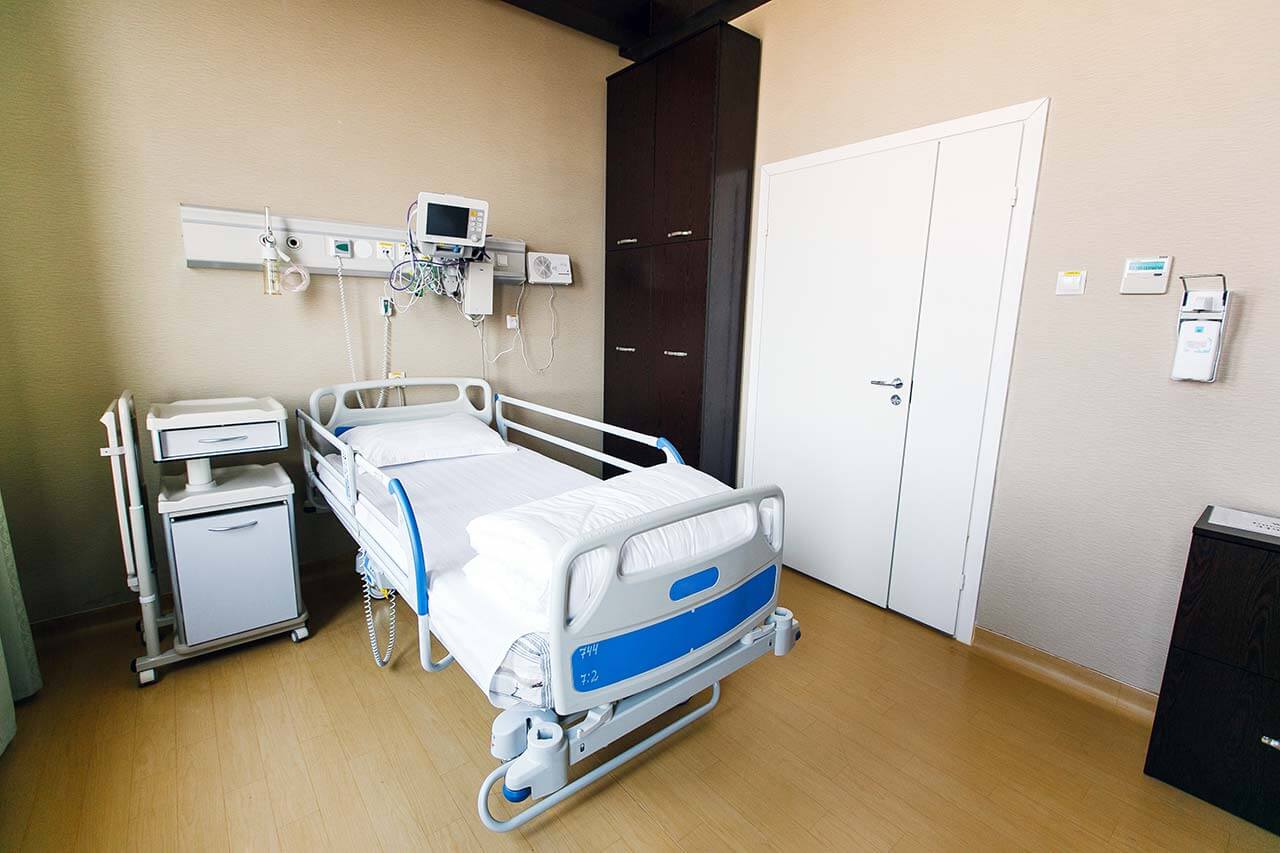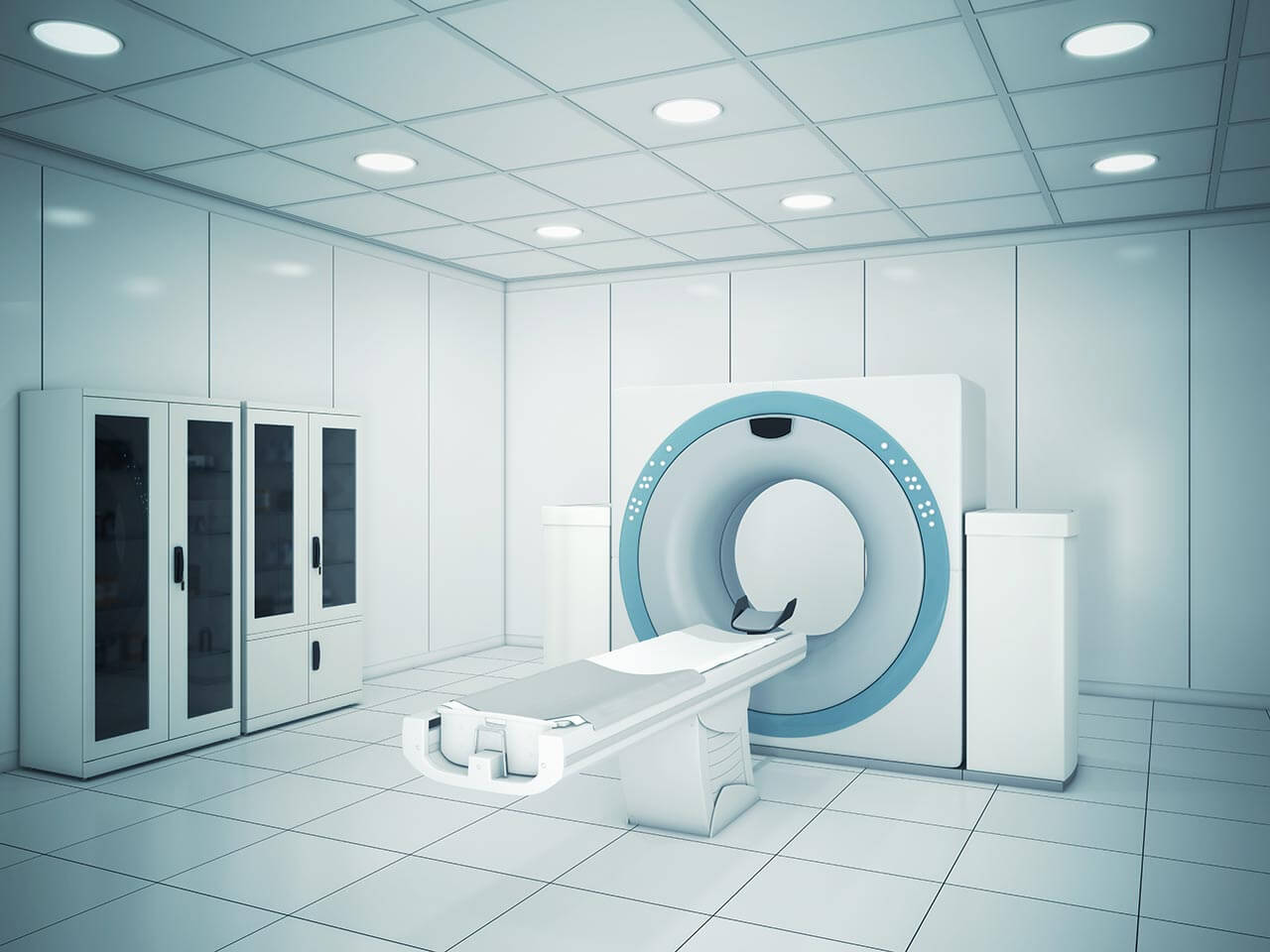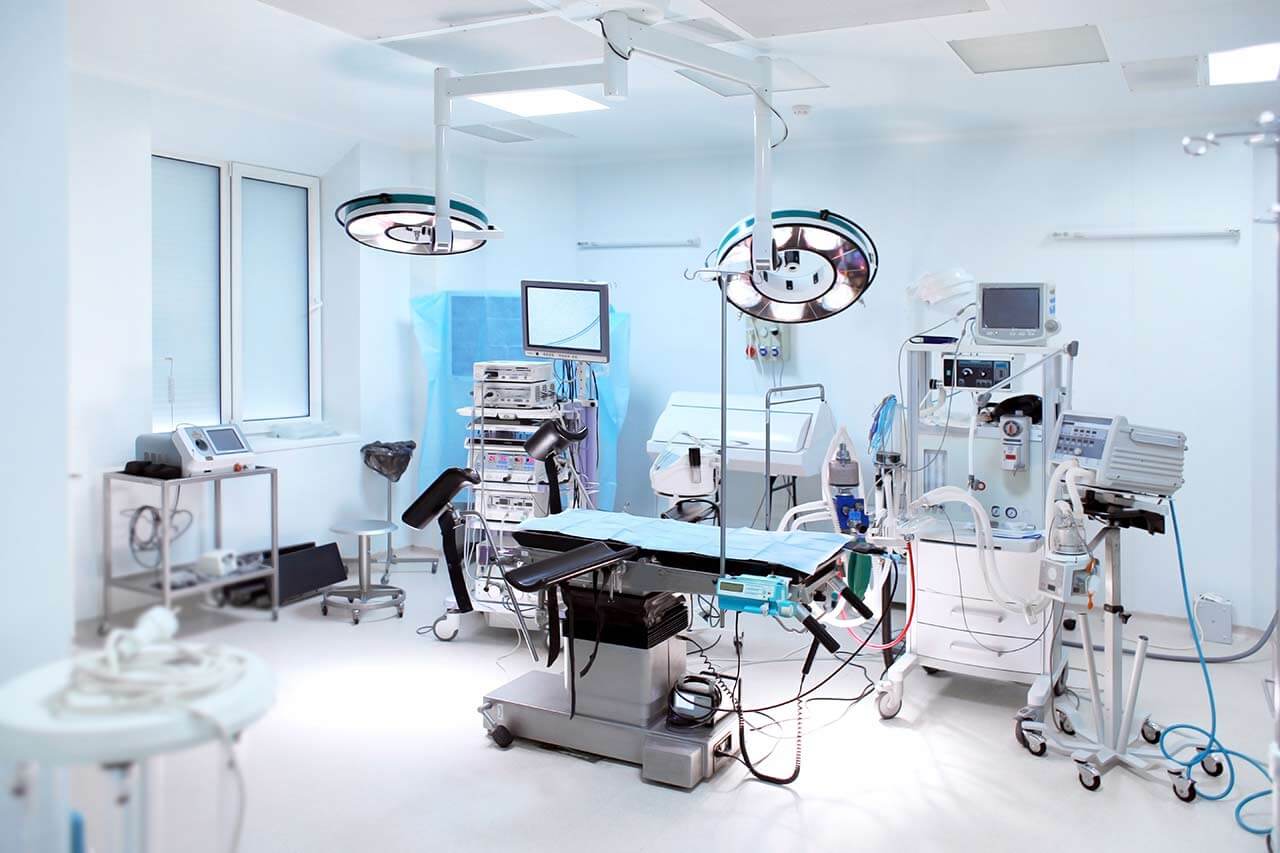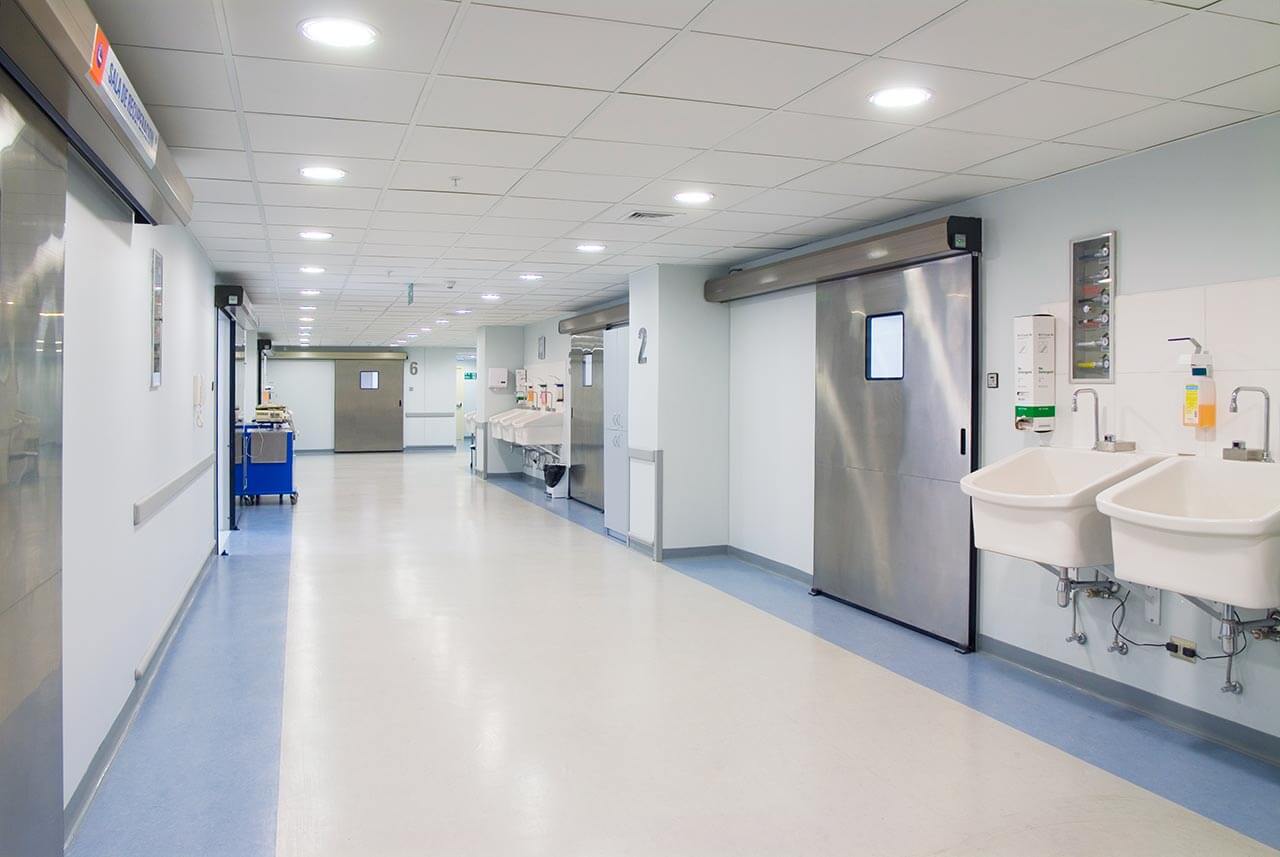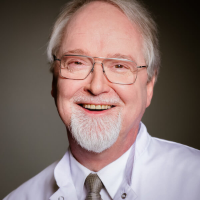
The program includes:
- Initial presentation in the clinic
- clinical history taking
- review of medical records
- physical examination
- laboratory tests:
- complete blood count
- general urine analysis
- biochemical blood analysis
- inflammation markers (CRP, ESR)
- blood coagulation analysis (aPTT, PT, INR)
- hormonal examination (somatotropic hormone, IGF-1, TSH)
- CT/MRI (if clinically indicated, additional cost is 650/1200)
- consultation of related specialists
- symptomatic specific treatment
- nursing services
- control examinations
- developing of further guidance
Required documents
- Medical records
- Results of hormone blood tests (if available)
Service
You may also book:
 BookingHealth Price from:
BookingHealth Price from:
About the department
According to the Focus magazine, the Department of Cardiology, Nephrology and Pulmonology at the Alfried Krupp Hospital in Essen-Ruettenscheid ranks among the best medical facilities in Germany!
The department offers all the possibilities of modern medicine for prevention, diagnostics and treatment of diseases of the cardiovascular system, lungs and kidneys. The primary focus of the department's clinical activities is on drug therapy and interventional treatment of cardiovascular pathologies. The medical facility is certified by the German Cardiac Society (DGK) as a heart failure unit and a chest pain unit. A special role is given to the treatment of heart rhythm disturbances (arrhythmias). The main task of the department's pulmonologists is to detect and treat lung diseases. The department's special offer in the field of pulmonology is extracorporeal membrane oxygenation (ECMO) in patients with severe acute respiratory failure. In addition, the medical facility has all the necessary technical resources to detect and treat kidney diseases, including kidney lesions caused by arterial hypertension. The department's nephrologists carry out treatment using pharmacotherapy, extracorporeal techniques and renal replacement therapy.
The department is headed by Prof. Dr. med. Thomas Budde. According to the Focus magazine, the professor ranks among the best cardiologists in Germany. Prof. Budde has been in clinical practice for over 25 years, which testifies to his high professionalism.
The department has all the necessary structural units to provide comprehensive and effective medical care to patients with cardiovascular pathologies. There is an outpatient clinic, a day clinic, a chest pain unit, a heart failure unit, an intensive care unit, and an intermediate care station. Diagnostics and treatment are carried out in accordance with the very latest guidelines from the German Cardiac Society (DGK), the European Society of Cardiology (ESC), the American Heart Association (AHA) and the American College of Cardiology (ACC). The department's specialists successfully carry out non-invasive and invasive treatment of acute and chronic forms of coronary heart disease, structural heart valve diseases, cardiomyopathies and heart failure. Whenever possible, the team of cardiologists uses only pharmacotherapy, but if it does not give the desired result, doctors resort to catheter-based interventions. Such interventional procedures allow achieving good therapeutic results, while eliminating the need for traumatic surgery with thoracotomy. The department's doctors most often perform percutaneous transluminal coronary angioplasty, implantation of drug-eluting stents for coronary artery stenoses and occlusions, interventional closure of atrial septal defects using a special occluder, cardiac resynchronization therapy, etc.
An important role in the clinical practice of the medical facility is assigned to the detection and treatment of arrhythmias. The causes of cardiac arrhythmias can be quite varied and range from congenital or acquired pathologies of the cardiac conduction system to arterial hypertension and thyroid diseases. The department's doctors specializing in electrophysiology have a huge arsenal of techniques to effectively detect cardiac arrhythmias, determine their type and select the optimal treatment tactics. It should be noted that the department has an innovative CARTO system, which is used to create a 3D model of the heart using a navigation system. CT and MRI scans can also be imported into the CARTO system, thanks to which the attending physician receives comprehensive clinical information. In most cases, doctors of the medical facility successfully cure arrhythmias with medications and/or catheter ablation. The department's specialists strive to rapidly implement innovations into clinical practice, which is confirmed by the fact that in April 2021 the medical facility became the fifth in the world in the treatment of atrial fibrillation with a revolutionary novel method called pulsed-field ablation (PFA). The therapeutic procedure is a modern alternative to all available types of ablation. The essence of the method is that short pulsating current impulses target only those cardiac tissues that provoke an accelerated irregular atrial rhythm. The innovative type of ablation therapy is safer than others and allows for positive dynamics in the shortest possible time.
The team of the department's highly qualified pulmonologists specializes in the treatment of lung diseases. Diagnostic options in this field include pulmonary function tests (spirometry, body plethysmography and diffusion capacity testing), flexible bronchoscopy, diagnostic bronchoalveolar lavage, sampling for histological and cytological tests, etc. The treatment is most often based on the intake of pills. The specialists also have the necessary equipment and professional skills for therapeutic bronchoalveolar lavage (for example, for interstitial lung disease), bronchoscopic hemostasis, argon plasma coagulation, drainage for pleurisy and pleural empyema, pleurodesis, etc. In acute pulmonary insufficiency, classical mechanical ventilation and a modern procedure for extracorporeal membrane oxygenation (ECMO) are performed. The last option for maintaining lung function allows maximizing the preservation of lung tissue and practically eliminates restrictions in the work of the lungs after the completion of the course of therapy.
Nephrology is an integral part of the clinical activities of the department's doctors – the department is certified by the German Society of Nephrology (DGfN). The key focus is on the management of acute and chronic kidney failure. The specialists of the medical facility carry out all modern types of renal replacement therapy (dialysis), including hemodialysis, peritoneal dialysis, hemodiafiltration, continuous venovenous hemofiltration, and also provide comprehensive patient care before and after kidney transplant. In addition, the tasks of nephrologists include plasmapheresis – a procedure for removing toxic substances from the blood.
The department's range of medical services includes the following options:
- Cardiology
- Therapeutic cardiac catheterization
- Percutaneous transluminal coronary angioplasty for the treatment of coronary artery stenosis
- Implantation of drug-eluting stents for coronary artery stenoses and occlusions
- Recanalization for chronic coronary artery occlusions, including with the use of rotablation
- Implantation of stents for stenosis of the main arteries and complete revascularization for cardiogenic shock and myocardial infarction
- Percutaneous implantation of an assistive device Impella 2,5 for left ventricle in high-risk coronary interventions and during the treatment of acute cardiogenic shock
- Interventional closure of atrial septal defects with a special occluder
- Interventional closure of the left atrial appendage with a special occluder
- Interventional treatment of mitral valve insufficiency using the MitraClip technique
- Stent implantation for renal artery stenosis
- Catheter ablation for the treatment of arrhythmias
- Implantation of pacemakers and defibrillators, as well as further monitoring of the functioning of devices
- Implantation of devices for cardiac resynchronization therapy
- Emergency medical care for acute coronary syndrome (around the clock)
- Therapeutic cardiac catheterization
- Pulmonology
- Therapeutic bronchoalveolar lavage
- Bronchoscopic hemostasis
- Argon plasma coagulation
- Drainage for pleurisy and pleural empyema
- Pleurodesis
- Classical artificial ventilation
- Extracorporeal membrane oxygenation (ECMO)
- Nephrology
- Pharmacotherapy
- Renal replacement therapy (dialysis)
- Hemodialysis
- Peritoneal dialysis
- Hemodiafiltration
- Continuous venovenous hemofiltration
- Plasmapheresis (procedure for removing toxic substances from the blood)
- Patient care before and after kidney transplant
- Other medical services
Curriculum vitae
Prof. Dr. med. Thomas Budde heads the Department of Cardiology, Nephrology and Pulmonology at the Alfried Krupp Hospital in Essen-Ruettenscheid. The specialist is rightfully proud of the status of one of the leading cardiologists in Germany, specializing in invasive and non-invasive diagnostics, as well as in the treatment of cardiovascular diseases. According to the Focus magazine, he ranks among the best cardiologists in the country. Prof. Budde has been in clinical practice for over 25 years, so he can be deservedly proud of his rich clinical experience. The doctor is certified by the German Cardiac Society (DGK) and the European Society of Cardiology (ESC). He is distinguished by his particular professional skills in the field of interventional cardiology and cardiac electrophysiology. Dr. Thomas Budde also has additional qualifications in intensive care.
Photo of the doctor: (c) Alfried Krupp Krankenhaus
About hospital
The Alfried Krupp Hospital in Essen-Ruettenscheid began its work back in 1870, and large-scale restoration took place here in 1980. The medical facility is an academic hospital of the University of Duisburg-Essen, thanks to which it has access to innovations in the medical field, and also makes its own contribution to the development of modern therapeutic techniques. The hospital has 13 departments and various highly specialized centers, including the Breast Center, Endoprosthetics Center, Lung Cancer Center, Trauma Center and others. The hospital has 575 beds for patient hospitalization. The hospital also offers outpatient medical care. Every year, the hospital's team of doctors admits over 80,000 patients for diagnostics and treatment. For many years, the medical facility has held a leading position in the German medical arena, and is also widely known for its high quality standards in many other countries of the world. The hospital can be proud of its successful experience in providing medical care to foreign patients.
The priority fields of the hospital's work include the treatment of oncological, hematological, gastroenterological, gynecological, urological, neurological, orthopedic and other diseases. The high quality standards of medical care are facilitated by the constant updating of medical equipment and advanced training courses for medical personnel. The hospital widely applies modern methods of conservative treatment, progressive laparoscopic surgical techniques, as well as innovative robotic surgery using the da Vinci Xi system.
The medical facility has been awarded numerous quality certificates confirming the outstanding clinical work of its specialists. These include, in particular, a certificate of the German Society for General and Visceral Surgery (DGAV) in the field of bariatric surgery, colorectal surgery, pancreatic surgery and minimally invasive surgery, an endoCert certificate in the field of joint replacement surgery, a certificate of the German Cardiac Society (DGK) in the field of emergency cardiac care, a certificate of the German Cancer Society (DKG) in the treatment of prostate and lung cancer, a certificate of the German Stroke Society, a certificate of the German Society of Phlebology and others.
Special attention should be paid to the exceptional professionalism of the doctors working at the hospital, who apply all their rich experience and deep knowledge to restore the health of patients. The specialists use an individual approach in their work and carefully think over each treatment regimen so that the patient gets the maximum result, but at the same time the course of therapy is as sparing as possible. The hospital's team of doctors keeps pace with the very latest medical advances and actively implements them into clinical practice for the benefit of patients.
Photo: (с) depositphotos
Accommodation in hospital
Patients rooms
The patients of the Alfried Krupp Hospital in Essen-Ruettenscheid live in comfortable single and double rooms with light colors. For maximum convenience, each patient room has an ensuite bathroom with shower and toilet. The patient room includes a comfortable automatically adjustable bed with an orthopedic mattress, a bedside table, a wardrobe, a table and chairs, as well as a TV and a telephone. Wi-Fi is available upon request.
The hospital also offers enhanced-comfort rooms corresponding to the level of an upscale hotel room. Such patient rooms additionally include upholstered furniture, a safe, a minifridge, and an air conditioner. Daily fresh newspapers, seasonal fruits, coffee and tea are offered to the patient in the room (upon request).
Meals and Menus
The patients of the hospital are offered delicious meals three times a day. Breakfast and dinner are served buffet style with a wide selection of cheese, cold meats, vegetables, fruits, pastries, etc. For lunch, there is a choice of several set menus. The patients living in an enhanced-comfort room benefit from a separate menu for breakfast, lunch and dinner with a large assortment of delicious dishes.
Further details
Standard rooms include:
Religion
The services of representatives of religions are available upon request.
Accompanying person
During an inpatient program, an accompanying person can stay with you in the patient room or in a hotel of your choice.
Hotel
During an outpatient program, you can stay in a hotel of your choice. The managers will help you choose the most suitable options.
